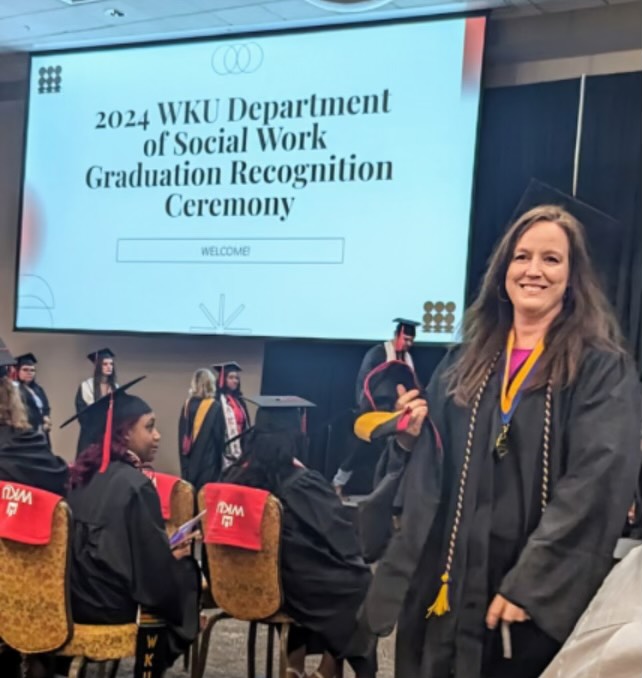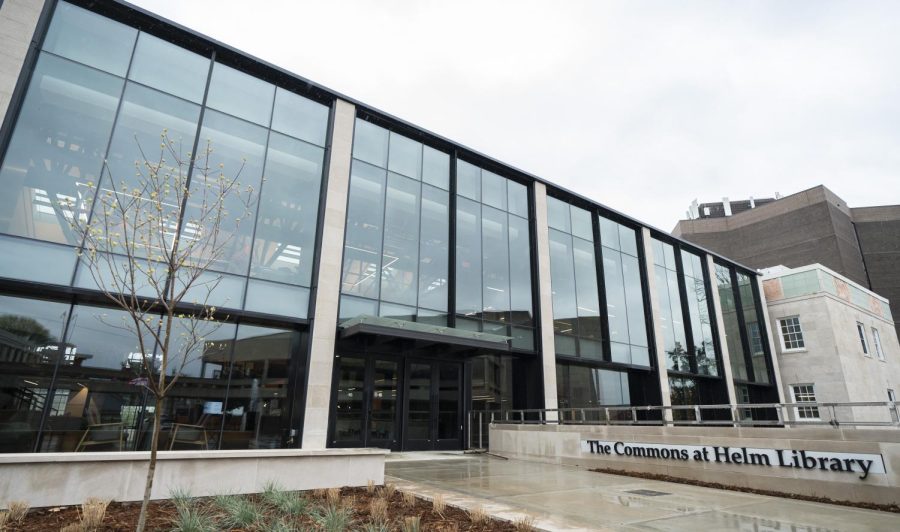Sitting inside Spencer’s Coffee in downtown Bowling Green, Tracey Hays, 41, sips her coffee. To her left is her oldest daughter, Sadie, who listens attentively to the stories her mother shares: what Hays faced and overcame to get to where she is now — a WKU alumna.
Hays graduated in May with a master’s in social work. She originally came to WKU and completed her undergraduate degree in psychology in 2006, but it wasn’t until 2020 that she came back to the Hill for her master’s.
For three years, she was enrolled part-time but ultimately decided to transition to being a full-time student.
“I didn’t want to overwhelm myself,” Hays said, “And then I was like, ‘ Oh my gosh, I’m tired of being in school.’”
Hays originally enrolled at the University of Louisville after she had graduated from high school in 2000. Not long after she started college, her family home burned down. Then, her sister died in a car wreck. Hays said she spiraled into a depression.
Hays left Louisville and moved back home to Monroe County, which she said was one of the biggest mistakes she’s ever made because it was there where she started running with the wrong crowd and — trying to escape the pains of loss — started to use hard drugs.
“It’s like I lost the will to live,” Hays said. “My body was slowly shutting down on me, like I was dying from a broken heart.
After a time, Hays said she felt the need to make a change in her life. Her dad told her she needed to go back to college to finish her degree, so she enrolled at WKU.
Hays finished her degree in the summer of 2006, and then she got pregnant and gave birth to Sadie in 2007.
However, everything fell apart in 2008 with the recession, Hays said. She said she didn’t have faith to provide financially as a single mother.
“Nobody could get a job,” she said. “I should have went back to work, but I really just felt like, as a single parent, that I didn’t think I could do it.”
Hays started a new relationship in 2009. But when that relationship started to deteriorate, and the pressures of the recession continued to press down on her, she started using again, she said. She had been clean from hard drugs for about six years.
Hays ended up getting into trouble with the law and built up a criminal record, which made it hard for her to get jobs and housing.
“I even had the ability to get some jobs, and they said ‘We can’t because this is on your record,’” Hays said.
In 2013 Hays gave birth to her second daughter, Riley, and found a job with Magna, a production and manufacturing factory. But she said no matter how much effort she put into work, she could never break through financially. So, she went back to hard substances, and everything fell apart for a couple of years, she said.

Hays had gotten three separate DUIs in 2007, 2016 and 2018. Once she got the final one in 2018, she knew her life had to change for good.
“I knew at that point that I wasn’t going to live like that anymore,” Hays said. “I was just going to keep trying as hard as I could until something broke through.”
Hays spent about 12 days in jail and wrote herself a letter, which she still has, examining her life and all of her relationships.
Hays said that she believes in a higher power and in somebody that loves her and wants what’s best for her. But as far as a specific religious view, she said she believes in what works for her. She had tried religion throughout her life as a way to cope with her depression but did not find any results. But, she said that while she was in jail she decided to pray and her urge to use was gone.
After her time in jail, Hays graduated from drug court and went on to apply for WKU’s master’s of social work program.
When she wrote her application letter, Hays had to display all of her past struggles.
“I had so much shame and embarrassment,” she said. “It made me, for the first time, look at all my stuff, and it made me sick.”
Hays has now graduated from the program and has reflected on all it offered her.
“I really didn’t know if I could do it,” she said. “I had all this fear.”
The social work program became a place of community for Hays and one of the first places she said she felt accepted.
“I was encouraged and valued, and my input was valued,” she said.
Hays said that she felt respected validated when she voiced her opinions on policies that were taught in classes.
“Tracey was passionate about any policy that impacted vulnerable populations,” April Murphy, an associate professor of social work, said in an email. “She embodies characteristics of a true social worker and understands how systemic issues can negatively impact marginalized individuals, especially those with limited resources and (little) knowledge about how the system works.”
Hays said that Murphy supported her a lot.
“When I had to write about those things (policies), I would get pretty emotional, you know, kind of feeling a little bit of anger at some of the policies that exist,” Hays said. “She helped me recognize that those feelings were there.”
Hays is concerned about how policies affect people with addictions.
“I’m not saying that there shouldn’t be consequences for people’s actions, but it shouldn’t be so hard to get back on your feet,” she said.
Someone could be clean from drugs for a while, but because a record may hang over them, they can’t find a job, Hays said.
Hays said she wishes there were more policies that could push people toward treatment rather than punishment.
“Punishment does not work,” she said.
According to a study written by three researchers at the National Institute on Drug Abuse, punishment alone is both futile and ineffective in responding to drug abuse.
“The increase in the number of drug-abusing offenders highlights the urgency to institute treatments for populations involved in the criminal justice system,” their report said.
“I think there is a balance between ‘punishment’ and rehabilitation,” Murphy said in an email, “There has to be accountability for actions, but yet rehabilitation efforts work. I have to believe in the power of rehabilitation as a human and as a social worker – we are not the sum of our mistakes but deserve an opportunity to do better.”
Hays said that she hopes to make changes in how communities help and accept people with addiction, and she said that she wishes there were more ways for people charged with crimes to go straight into treatment.
“I know it seems like a lot of money that people are having to pay in taxes, but if it could create this ripple effect and make our communities and stuff safer, I mean, wouldn’t it all be worth it?” Hays said. “Things need to change.”
Hays said she wants people to know that it’s never too late to turn their life around.
“If you don’t want to continue to live the same experience, you have to change,” Hays said. “The results of change cannot be seen overnight, so it takes time and patience.”
Present actions, Hays said, are the results of past decisions, and it can take time for the results of positive choices to catch up.
“I hope that anyone who struggles with addiction has the chance to experience recovery and all the blessings it has to offer,” Hays said.
Sitting beside her at Spencer’s, Sadie listened to Hays dive deep into her past, retrieving difficult memories.
For some of Sadie’s life, her mother hadn’t been present.
“Life was really hard,” Sadie said.
However, Sadie said that Hays has worked hard to bring their family to a better life.
News reporter Cameron Shaw can be reached at [email protected].





